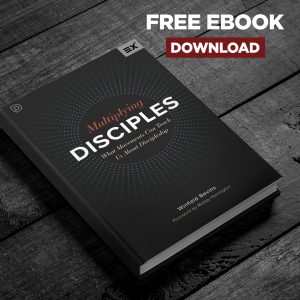The Truth About Jesus’ Commandments in Discipling Relationships
In his great commission, King Jesus told us to make disciples who “obey everything that he commanded” (Matt. 28:18-20).
If we are honest, that presents us with a big challenge today: we must be clear on Jesus’ commandments so that we can obey them.
But how can we be clear on the meaning of anything these days?
The Oxford Dictionary chose “post-truth” as the 2016 Word of the Year. The Washington Post declared this news with, “It’s official: Truth is dead. Facts are passé”.
As our political and religious discourse shows, objective facts are less influential in shaping our perception of reality than appeals to emotion and self-inspired beliefs (i.e., believing what we want to be true).
I look forward to discussing this question at a deeper level with you, the Discipleship-First Tribe in 2019 at the National Forum. For now, let me share five elements that guide me as I personally seek clarity on Jesus’ teachings so that I can obey them as a disciple and a disciple maker. I hope they will encourage you to take the same path.
1. I Pray Earnestly that God will Make Jesus’ Truths Clear in Our Culture Today
One’s perception of truth is ultimately a spiritual matter. It is easy to only see what we want to see. For example, God’s Word tells us that Satan has blinded the minds of unbelievers so that they cannot “see the light of the gospel that displays the glory of Christ” (2 Cor. 4) and Jesus taught his disciples, in the context of teaching them about prayer, that they must be people who “ask, seek, and knock” (Luke 11:1-13). To see the truth, we must personally start with a clear commitment to God to pursue his truth in all it’s purity. Jesus made us a promise in this regard: Blessed are the pure in heart, for they will see God (Matt. 5:8).
2. I Expect Truth to be Knowable, but Sometimes Complex
The truth and clarity of many of Jesus’ commands are easy. But sometimes it is hard and confusing. In most areas of life we know that if we are careful, if we examine all the evidence, if we get good counsel, if we use good reasoning, etc.,. then we can find truth. It is important to take the same approach as we examine God’s Word. The Bereans are a good example for how we too can know the truth today, especially in contrast to the Thessalonians who were hard-hearted. Luke describes them for us: “Now the Berean Jews were of more noble character than those in Thessalonica, for they received the message with great eagerness and examined the Scriptures every day to see if what Paul said was true” (Acts 17:11).
3. I Focus on the Central Truths as a Priority
Some of Jesus’ teachings are more central and important than others. I seek to focus on those truths. For example, the gospel in 1 Corinthians 15:1-8 is described in the text itself as more central than something like the thousand year reign in Revelation 20:1-6. Jesus described how the Pharisees lost their way on this point. He said, “Woe to you, teachers of the law and Pharisees, you hypocrites! You give a tenth of your spices—mint, dill and cumin. But you have neglected the more important matters of the law—justice, mercy and faithfulness” (Matt. 23:23). Likewise, as I seek to know the truth about Jesus, I seek it best by pursuing things that are central in his Word.
4. I Listen to the Classic and Historical Christian Consensus
People have been following Jesus for about 2,000 years in all kinds of contexts, cultures, and countries. That is a lot of Christians to have come before us. They have been led by the Holy Spirit and they uniformly came to a classic and historical consensus on many truths that have stood the test of time. I follow God’s word, first and foremost. But I then listen to those who have come before us, especially those closest in time to Jesus and the apostles. They are not perfect guides, but they have something to teach us. As an example, imagine you are with 100 older, wise people who have thought a lot about a teaching and lived it out for many years, and after a lot of thought, prayer, and study 99 of them look at truth one way. Then a new comer, under a lot of pressure from her culture arrives and says we should look at things differently. She might have a point, but it is wise to first listen to the 99 who came before her, especially those who lived in other cultures. If we are thinking so differently than all of those Christians who have come before us, we should carefully ask, “Is it the Holy Spirit speaking to us through this person or is it pressure to conform to our culture?”
5. I Made a Commitment to be Tough-Minded about Jesus’ Truth
The greatest commandment is to love God. And that means that God wants us to love him holistically, with everything we have, with “all of [our] heart, mind, soul, and strength” (Luke 10:27). Part of loving God is loving him with my mind. I want to have a mind that is loyal to God above all. I resisted full-time ministry for about 5 years after a bachelor’s and master’s degree in Bible because of the warning that not many should be teachers in James 3:1 (teachers will be judged more strictly by God). I entered paid ministry only after making a commitment to God to uphold God’s truth. That is requiring a tough-mindedness today. The apostle Paul put it this way: We demolish arguments and every pretension that sets itself up against the knowledge of God, and we take captive every thought to make it obedient to Christ. (2 Corinthians 10:5). I am committed to that last phrase – to take every thought and make it obedient to Christ.
I believe that most in our discipleship-first tribe share these same commitments. I hope that articulating them helps us to all pursue Jesus’ commands and hold fast to them in obedience.
We want to completely surrender to God and ask him to guide us – and then we must not give in to cultural pressure.
It is the best and most God-honoring posture to take and the best way to live a life that pleases God!
Written by Bobby Harrington
Bobby Harrington is the CEO of Discipleship.org, a national platform, conference, and ministry that advocates for Jesus’ style of disciple making. He is the founding and lead pastor of Harpeth Christian Church (by the Harpeth River, just outside of Nashville, TN). He has a Doctor of Ministry degree in consulting and has spent years as a coach to church planters and senior pastors. He is the author of several books on discipleship, including DiscipleShift (with Jim Putman and Robert Coleman) and The Disciple Maker’s Handbook (with Josh Patrick).
Photo by David Travis on Unsplash






